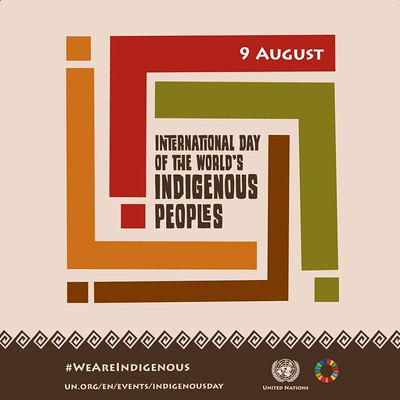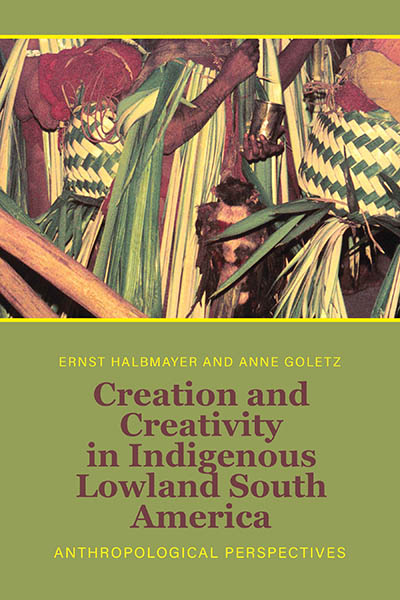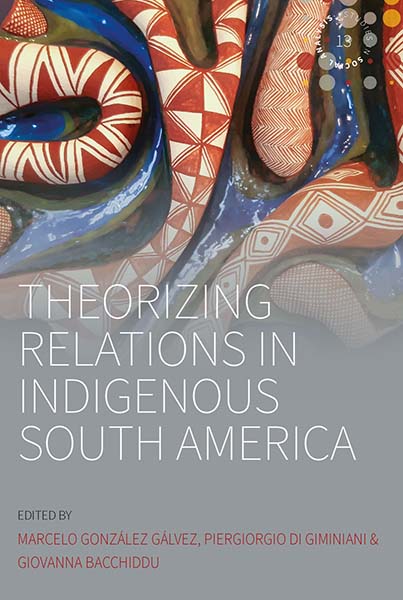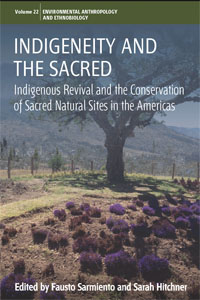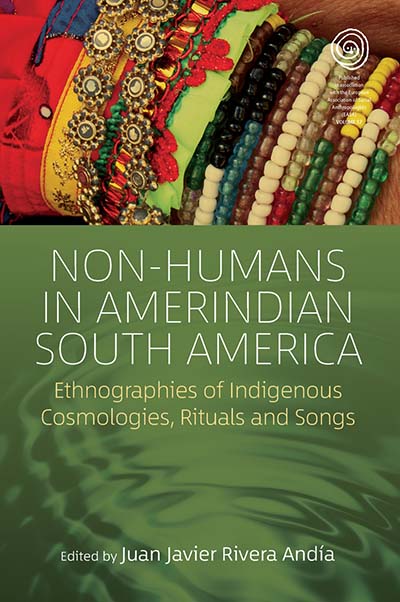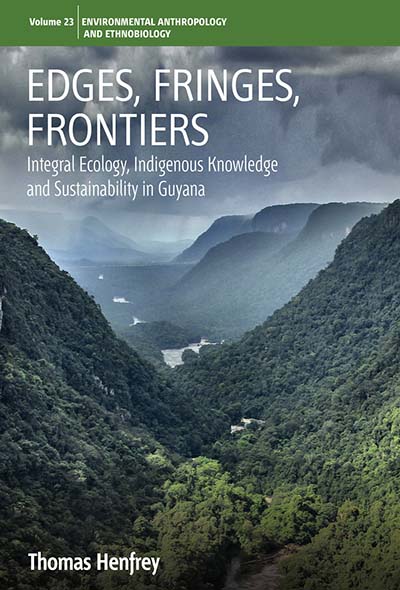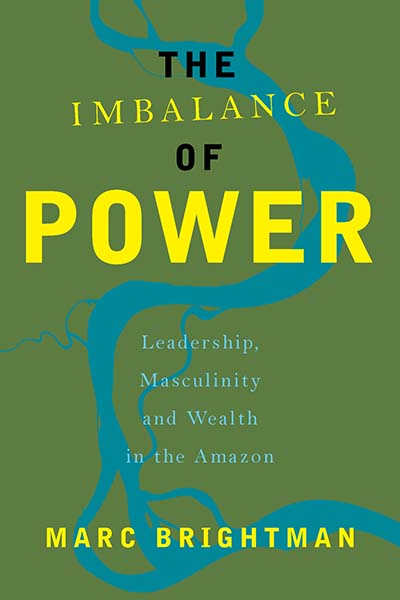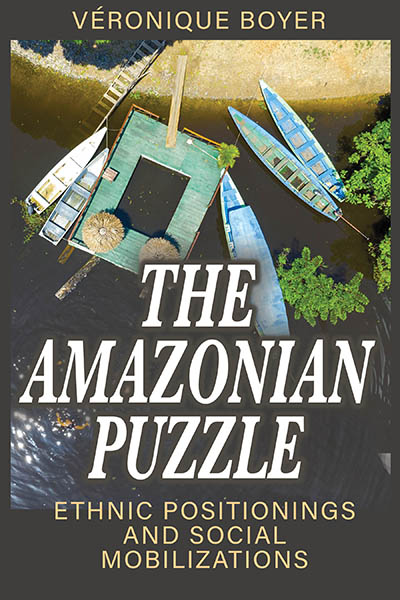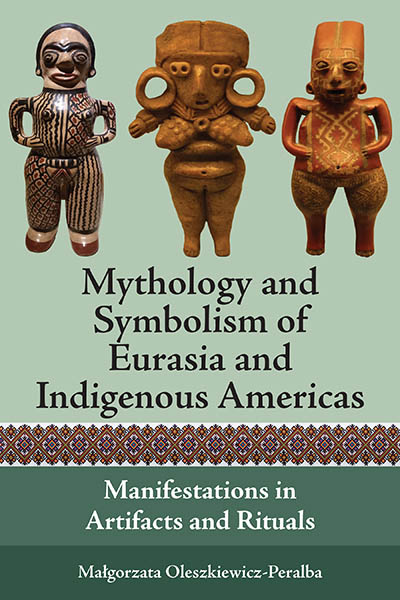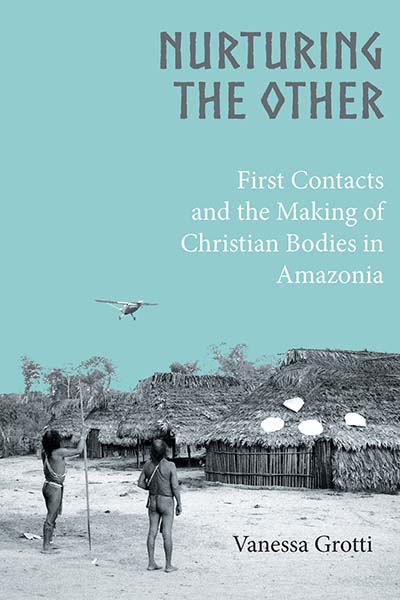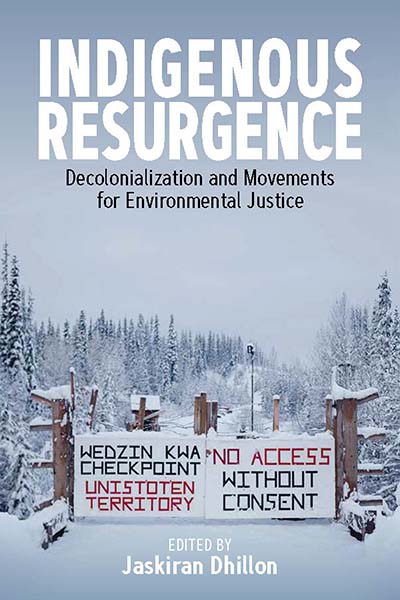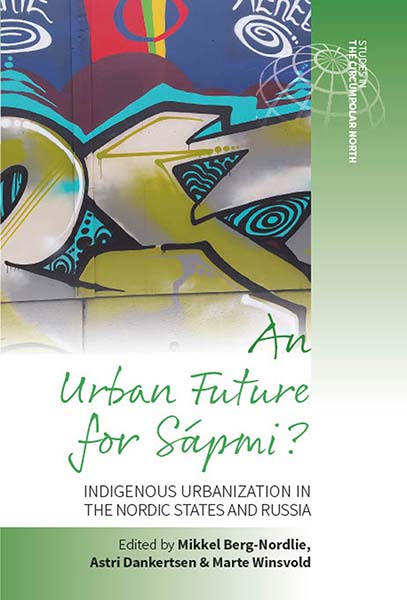The United Nations’ International Day of the World’s Indigenous Peoples is observed on August 9 each year to honor the estimated 370 million indigenous people around the world. The day was established to recognize the first meeting of the United Nations Working Group on Indigenous Populations held in Geneva in 1982.
This year’s theme is “Indigenous youth as agents of change for self-determination,” commemorating the Indigenous youth at the forefront of some of the most pressing crises facing humanity today. For more information, please visit UN.org.
Celebrate Indigenous Peoples’ Day by learning more about indigenous populations from around the world.
In the spirit of this day, we are featuring a collection of titles on indigenous groups from around the world. Scroll down to read freely accessible introductions. For a wider selection, visit our Anthropology page.
Berghahn Journals is also offering free access to related articles and special issues. See below for details.
CREATION AND CREATIVITY IN INDIGENOUS LOWLAND SOUTH AMERICA
Anthropological Perspectives
Edited by Ernst Halbmayer and Anne Goletz
“This volume is an outstanding piece of scholarship, which, from the standpoint of the processes of creation and creativity, accomplishes, in a good measure, a critique and reassessment of current styles on analyzing Amazonian sociality.” • Juan Alvaro Echeverri, Universidad Nacional de Colombia
Read introduction
THEORIZING RELATIONS IN INDIGENOUS SOUTH AMERICA
Edited by Marcelo González Gálvez, Piergiorgio Di Giminiani and Giovanna Bacchiddu
This collected volume explores how ethnographies of indigenous South America have helped to inspire this analytic shift, demonstrating the continued importance of ethnographic diversity.
Read introduction
INDIGENEITY AND THE SACRED
Indigenous Revival and the Conservation of Sacred Natural Sites in the Americas
Edited by Fausto Sarmiento and Sarah Hitchner
“The effect of the whole [volume] is to emphasize the importance of saving sites locally sacred to Indigenous or majority peoples, and to take full account of how they are regarded and how they must be reverently and civilly managed to keep from offending…Highly recommended.” • Choice
Read introduction
NON-HUMANS IN AMERINDIAN SOUTH AMERICA
Ethnographies of Indigenous Cosmologies, Rituals and Songs
Edited by Juan Javier Rivera Andía
“This exciting collection of essays by a wonderful group of authors, anchored by an extensive theoretical introduction, engages with some of the most heatedly debated subjects of South American ethnography today.” • Anthony Seeger, UCLA
Read introduction
EDGES, FRINGES, FRONTIERS
Integral Ecology, Indigenous Knowledge and Sustainability in Guyana
Thomas B. Henfrey
“Henfrey offers a complex and creative way to rethink the climate crisis, with a sharp critique of dominant, Western shaped approaches, emerging from his ethnographic material, and guided by a complicated and nuanced theoretical framework… Overall, this book provides a new way to explore our environmental crisis and fundamentally rethink [our] understanding of, characterization of and engagement with our natural environment.” • Anthropos
Read introduction
THE IMBALANCE OF POWER
Leadership, Masculinity and Wealth in the Amazon
Marc Brightman
“This book makes a crucial contribution to Amazonian anthropology, bringing to the forefront a topic that has remained under-thematized in the last decades.” · Carlos Fausto, Universidade Federal do Rio de Janeiro
Read introduction
THE AMAZONIAN PUZZLE
Ethnic Positionings and Social Mobilizations
Véronique Boyer
By examining the multiple cultural and ethnic threads that traverse this landscape, The Amazonian Puzzle sets out to show how the category of caboclo (a powerful spiritual entity to some, and to others a despised peasant of mixed ancestry) reveals deep currents of ethnic recompositions, religious interpenetration, and social hierarchy.
Read introduction
MYTHOLOGY AND SYMBOLISM OF EURASIA AND INDIGENOUS AMERICAS
Manifestations in Artifacts and Rituals
Małgorzata Oleszkiewicz-Peralba
“This is one of those rare scholarly books where the author’s personal engagement … takes us to the heart of the subject with ease and joy. Dr. Oleszkiewicz-Peralba is a scrupulous researcher with nuanced understanding of the subject … She connects extremely diverse cultures across time and space through mythology, rituals, women’s clothing, and sacred art.” • Neela Bhattacharya Saxena, Nassau Community College
Read introduction
NURTURING THE OTHER
First Contacts and the Making of Christian Bodies in Amazonia
Vanessa Grotti
“Offers a unique perspective on the complexity of indigenous Amazonia today. By studying interactions between Christianized horticulturalists (Trio and Wayana) and ‘wild’ people (Akuriyo) with whom peaceful contact has more recently been established, Grotti avoids the usual pitfall of presenting a specific case study as typical of Amazonia in general.” • Olivier Allard, Collège de France
Read introduction
Of Relevant Interest
INDIGENOUS RESURGENCE
Decolonialization and Movements for Environmental Justice
Edited by Jaskiran Dhillon
“Although the essays were already published a while ago, they have not lost any of their relevance, and one can only wish that thanks to the volume being available through Open Access many people will discover this topical publication.” • Amerindian Research
Read introduction
AN URBAN FUTURE FOR SÁPMI?
Indigenous Urbanization in the Nordic States and Russia
Edited by Mikkel Berg-Nordlie, Astri Dankertsen and Marte Winsvold
“The book is very interesting, well written and relevant. I found it entirely fascinating and educational, and could see a lot of connections to issues that other urban Indigenous groups across the globe face.” • Kelly Greenop, University of Queensland
Read introduction
For a full selection of titles, please visit https://www.berghahnbooks.com/anthropology.
Berghahn Journals
Open Access Articles
ANTHROPOLOGICAL JOURNAL OF EUROPEAN CULTURES
Healing through Heritage?: The Repatriation of Human Remains from European Collections as Potential Sites of Reconciliation
Carsten Wergin (Vol. 30, Issue 1)
ANTHROPOLOGY IN ACTION
Indigenous Leadership, Anthropology and Intercultural Communication for COVID-19 Response in the Rio Negro Indigenous Territory, Brazilian Amazonia
Danilo Paiva Ramos, Alex Shankland, Domingos Barreto, and Renato Athias (Vol. 29, Issue 1)
The Structural Violence of Indigenous Suicide Prevention Policies in Canada
Bryce Anderson (Vol. 28, Issue 3)
Whose Reality Counts?: Emergent Dalitbahujan Anthropologists
Reddi Sekhara Yalamala (Vol. 27, Issue 1)
DEMOCRATIC THEORY
Democracies in the Ethnosphere: An Anthropologist’s Lived Experiences of Indigenous Democratic Cultures
Wade Davis and Jean-Paul Gagnon (Vol. 8, Issue 2)
Practicing Democracy from Childhood: Democratic Praxis in Te Ao Māori
Kylie Smith, Ksenija Napan, Raewyn Perkinson, and Roberta Hunter (Vol. 8, Issue 2)
ENVIRONMENT AND SOCIETY
Appropriate Targets: Global Patterns in Interaction and Conflict Surrounding Cetacean Conservation and Traditional Marine Hunting Communities
Florence Durney (Vol. 11)
JOURNAL OF LEGAL ANTHROPOLOGY
CIDEM’s femicide archive and the process of gendered legal change in Bolivia
Xandra Miguel-Lorenzo (Vol. 4, Issue 1)
MUSEUM WORLDS
Decolonization and Restitution: Moving Towards a More Holistic and Relational Approach – Report on the Panel on Ethnographic Museums and Indigenous People, ICOM Kyoto, September 2019
Michèle Rivet (Vol. 8)
Hinemihi o te Ao Tawhito: How a Māori Meeting House in England cultivated relationships and understanding
Michael Upchurch (Vol. 8)
The Politics of Indigeneity and Heritage: Indonesian Mortuary Materials and Museums
Kathleen M. Adams (Vol. 8)
REGIONS AND COHESION
Indigenous paradiplomacy and the Orokawe hydroelectric dam on the Kunene River
Richard Meissner and Jeroen Warner (Vol. 11, Issue 1)
Scratches on our sovereignty?: Analyzing conservation politics in the Sundarbans
Jayashree Vivekanandan (Vol. 11, Issue 1)
RELIGION AND SOCIETY
Cheyenne River Sioux Traditions and Resistance to the Dakota Access Pipeline
Ryan Goeckner, Sean M. Daley, Jordyn Gunville, and Christine M. Daley (Vol. 11)
SIBIRICA
The Impact of Extractivism on Indigenous Peoples: Social, Gender, and Economic Inequalities
Maria A. Pavlov and Nyurgun A. Leontiev (Vol. 22, Issue 1)
Arctic “Laboratory” of Food Resources in the Allaikhovskii District of the Republic of Sakha (Yakutia)
Nikolai Goncharov (Vol. 21, Issue 2)
Special Issue: Checking in on Sakha Studies (Vol. 20, Issue 2)
The Evolution of Forming “Territories of Traditional Nature Use” in the Sakha Republic (Iakutiia)
Nicholas Parlato, Gail Fondahl, Viktoriya Filippova, and Antonina Savvinova (Vol. 20, Issue 1)
“Deception begins with trade … ”: Vladimir Arsen’ev’s Economic Expertise and Challenges of Rationalizing Imperial Diversity in the Taiga
Aleksandr Turbin (Vol. 19, Issue 3)
The Political Ecology of Vladimir Arsen’ev
Sergey Glebov (Vol. 19, Issue 3)
Vladimir Arsen’ev and Whales in Russia’s Revolutionary Far East
Ryan Tucker Jones (Vol. 19, Issue 3)
The Representation of the Evenkis and the Evenki Culture by a Local Community Museum
Svetlana Huusko (Vol. 19, Issue 2)
Roads versus Rivers: Two Systems of Spatial Structuring in Northern Russia and Their Effects on Local Inhabitants
Kirill V. Istomin (Vol. 19, Issue 2)
Sensory Perception of Rock Art in East Siberia and the Far East: Soviet Archeological “Discoveries” and Indigenous Evenkis
Donatas Brandišauskas (Vol. 19, Issue 2)
SOCIAL ANALYSIS
The Colony as the Mystical Body of Christ: Theopolitical Embodiment in Mexico
Jennifer Scheper Hughes (Vol. 64, Issue 4)
Civilization as the Undesired World: Radical Environmentalism and the Uses of Dystopia in Times of Climate Crisis
Stine Krøijer (Vol. 64, Issue 3)
Monumental Suspension: Art, Infrastructure, and Eduardo Chillida’s Unbuilt Monument to Tolerance
Isaac Marrero-Guillamón (Vol. 64, Issue 3)
Taxes for Independence: Rejecting a Fiscal Model of Reciprocity in Peri-urban Bolivia
Miranda Sheild Johansson (Vol. 64, Issue 2)
Free Access to the Following Articles until August 23, 2023, using code IDWIP23
CONTENTION
From a “Double Task” to a “Double Contention” Perspective: On Academic and Activist Knowledge Production Processes
Júnia Marúsia Trigueiro de Lima (Vol. 10, Issue 1)
ENVIRONMENT AND SOCIETY
Special Issue: Indigenous Resurgence, Decolonization, and Movements for Environmental Justice (Vol. 9)
GIRLHOOD STUDIES
Decolonizing, Indigenizing, and Making Space for Indigenous Girls Visiting York University
Sarah Flicker, Amanda Galusha, L. Anders Sandberg, Jennifer Altenberg, and The Young Indigenous Women’s Utopia (Vol. 16, Issue 2)
Witnessing Public Mourning in Haudenosaunee Youth Theatre
Margot Francis (Vol. 15, Issue 2)
The End of the Tunnel: Girls’ Marked Bodies in the Canadian Transcarceral Pipeline
Sandrina de Finney and Mandeep Kaur Mucina (Vol. 14, Issue 3)
Where are all the Girls and Indigenous People at IGSA@ND?
The Young Indigenous Women’s Utopia Group, Cindy Moccasin, Jessica McNab, Catherine Vanner, Sarah Flicker, Jennifer Altenberg, and Kari-Dawn Wuttunee (Vol. 14, Issue 2)
Kokums to the Iskwêsisisak: COVID-19 and Urban Métis Girls and Young Women
Carly Jones, Renée Monchalin, Cheryllee Bourgeois, and Janet Smylie (Vol. 13, Issue 3)
Reflections on Expanding Girls’ Political Capital at the United Nations
Emily Bent (Vol. 13, Issue 2)
Imagining Alternative Spaces: Re-searching Sexualized Violence with Indigenous Girls in Canada
Anna Chadwick (Vol. 12, Issue 3)
Love as Resistance: Exploring Conceptualizations of Decolonial Love in Settler States
Shantelle Moreno (Vol. 12, Issue 3)
Red Ribbon Skirts and Cultural Resurgence: Kimihko sîmpân iskwêwisâkaya êkwa sihcikêwin waniskâpicikêwin
Kari Dawn Wuttunee, Jennifer Altenberg, and Sarah Flicker (Vol. 12, Issue 3)
Rekinning Our Kinscapes: Renegade Indigenous Stewarding against Gender Genocide
Sandrina de Finney, Shezell-Rae Sam, Chantal Adams, Keenan Andrew, Kathryn McLeod, Amber Lewis, Gabby Lewis, Michaela Louis, and Pawa Haiyupis (Vol. 12, Issue 3)
“Like Alice, I was Brave”: The Girl in the Text in Olemaun’s Residential School Narratives
Roxanne Harde (Vol. 10, Issue 3)
Social Media and the Sexual Exploitation of Indigenous Girls
Dustin William Louie (Vol. 10, Issue 2)
Special Section: Indigenous Girls (Vol. 9, Issue 2)
Under the Shadow of Empire: Indigenous Girls’ Presencing as Decolonizing Force
Sandrina de Finney (Vol. 7, Issue 1)
REGIONS AND COHESION
Ka’ux: Mixe language and biodiversity loss in Oaxaca, Mexico
Alfonsina Arriaga-Jiménez, Citlali Pérez-Díaz and Sebastian Pillitteri (Vol. 8, Issue 3)
From proclamation to denial: Indigenous rights and political participation in Venezuela
Catherine Alès (Vol. 8, Issue 2)
Indigenous participation in primary care services in Brazil: Autonomy or bureaucratization?
Eliana Elisabeth Diehl and Esther Jean Langdon (Vol. 8, Issue 1)
SCREEN BODIES
Special Section: Screening Indigenous Bodies (Vol. 4, Issue 1)
SIBIRICA
Special Issue: Indigenous Peoples, Urbanization Processes and Interactions with Extraction Firms in Russia’s Arctic (Vol. 18, Issue 3)
A Complex Approach to Identity Construction among Children of the Indigenous Peoples of the North, Siberia, and the Far East of the Russian Federation
Alena Vasilievna Ivanova (Vol. 18, Issue 2)
SOCIAL ANALYSIS
Special Issue: Theorizing Relations in Indigenous South America (Volume 63, Issue 2)
TRANSFERS
Your “Eyesore,” My History?: People and “Dead” Cars in a Remote Aboriginal Community
Kate Senior, Richard Chenhall, and Daphne Daniels (Vol. 11, Issue 1)
State of Uncertainty: Educating the First Railroaders in Central Sakha (Yakutiya)
Sigrid Irene Wentzel (Vol. 10, Issue 2-3)
Follow us on Social Media
For updates on all the exciting developments from Berghahn Books, become a Facebook fan, or follow us

